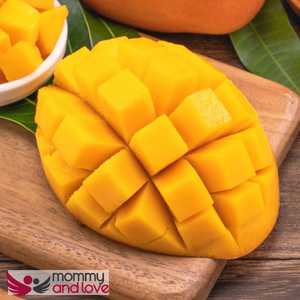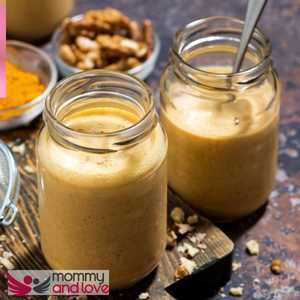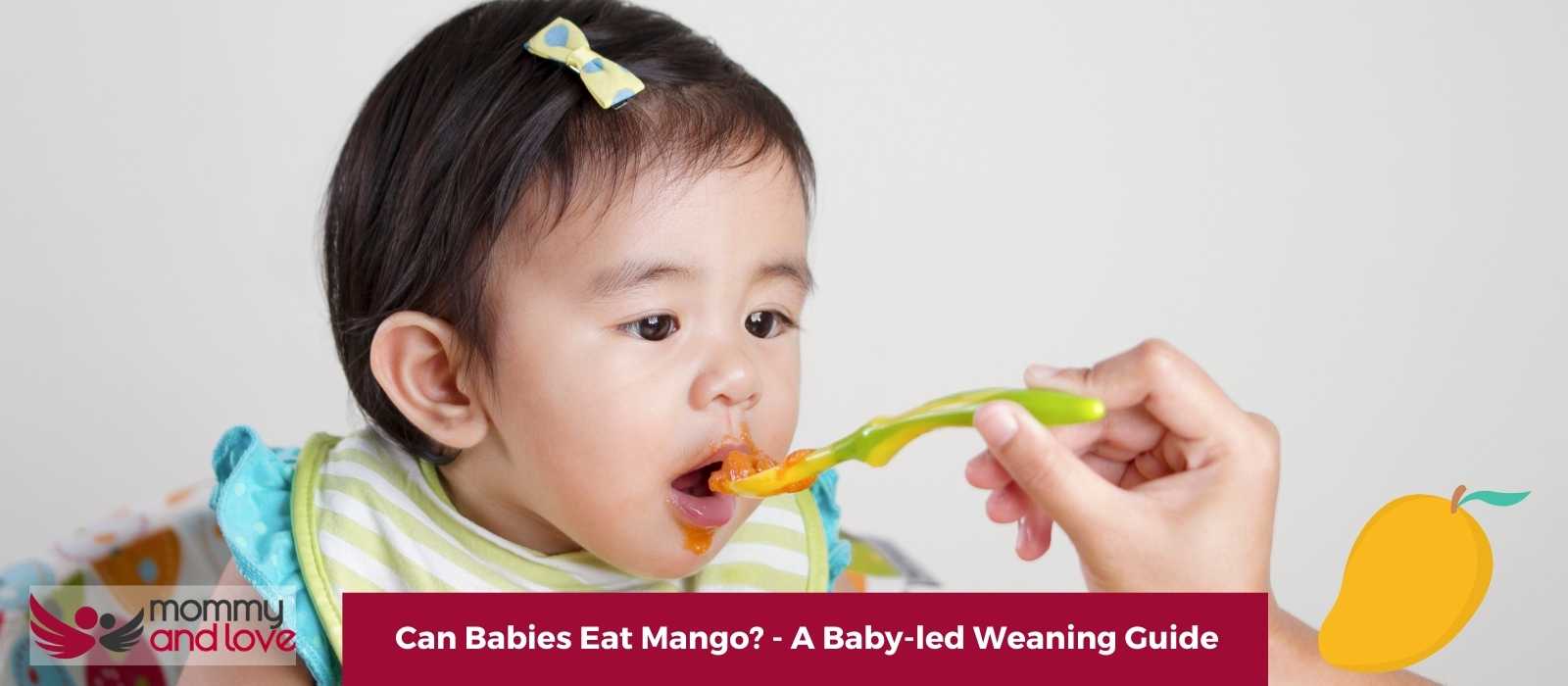Ripe mangoes are a delicious fruit that can be enjoyed by people of all ages. But can babies eat mango? The answer is yes!
They make for good first baby food. In this blog post, we will discuss the benefits of giving mango to your baby and provide a step-by-step guide on how to introduce it to their diet. We will also share some recipes that you can use to make feeding your baby mango fun and easy!
What Are the Nutrients Found in a Ripe Mango?

Mangoes originated from South Asia from there they spread worldwide. Mangoes are nutritious baby food and are also a good source of vitamin B-complex vitamins, including thiamin, niacin, and riboflavin.
Additionally, mangoes contain minerals such as potassium, magnesium, and copper. Lastly, mangos are a rich source of antioxidants like carotenoids and polyphenols.
These antioxidants scavenge harmful toxins and byproducts that can damage cells, leading to inflammation and disease. Hence, including mangoes in a child’s diet can provide a wealth of health benefits.
The nutritional value of mangoes are:
- Vitamin A helps maintain healthy eyes, skin and baby’s immune system.
- Vitamin C is the most important antioxidant protecting the body against infection and disease.
- Vitamin B6 helps to form hemoglobin, the part of blood that carries oxygen around the body.
- Potassium is an electrolyte mineral that helps regulate fluid balance, nerve impulses and muscle contractions.
- Excellent source of digestive enzymes and dietary fiber which aids digestion and prevents constipation and also beneficial for diabetic patients as it helps to control blood sugar levels by slowing down the absorption of carbohydrates.
Mangoes naturally have too much sugar. Babies like sweetness, so serving mangoes with other vegetables, fruits and whole foods can help them develop a taste for lots of different flavors.
If fresh mangoes aren’t available, you can choose frozen mangoes or canned mangoes packed in natural juices. You need to rinse the canned mangoes before giving them to your baby to get rid of the extra sugar.
Can We Give Mangoes to a 6-Month-Old Baby?

There is no definitive answer to this question as different babies will have different tolerances for different foods. However, in general, it is usually recommended to introduce mangoes to babies starting at six months old.
This is because a baby’s digestive system is still developing and isn’t ready to process solid food yet. The mango seed can form an excellent teething pad if there is still some mango attached to it.
Start with small amounts of food and gradually increase the amount as your baby gets used to it. If your baby has allergic reactions or experiences any discomfort or diarrhea after eating solid foods, stop giving them solids and consult with your pediatrician.
Are Ripe Mangoes a Choking Hazard for the Baby?
Mangoes are a choking hazard for the baby. The pit of the mango can cause obstruction in the airway, which can be deadly. Before you you let your baby eat mango, always cut them into small pieces to avoid any accidents.
Make sure to keep an eye on your little ones when they are eating this fruit to ensure their safety. Although they are a delicious snack, make sure to take precautions when feeding them mangoes.
Can Babies Eat Dried Mango?
No. You should wait to give your child dried mango until they are older. Generally, dried fruits can cause choking and often has preservatives and sulfites in them. If you have dried mango, you can re-hydrate it by soaking it in water until it gets soft again.
Can Babies Eat Unripe Mangoes?
The answer to this question is yes, babies can eat unripe or half-ripe mango. However, it is important to note that not all babies will enjoy eating unripe mango and some may even experience an upset stomach after eating it. If your baby does not like the taste of unripe mango, you can try blending it into a smoothie or feeding it to them in small pieces.
Unripe mango is a great source of vitamin C, potassium, and fiber, so it is a healthy snack option for babies. Just be sure to avoid feeding your baby too much fresh mango, as too much of anything can be harmful.
Can Babies Drink Mango Juice?
If your baby is under one year old, then no, you should not give her mango juice. Babies this young can’t have sweet juices even if they contain natural sugars and their digestive systems aren’t ready for fruit drinks. If your baby is older than one, then the answer depends on how much mango she’s eaten before.
Babies’ stomachs are pretty sensitive. They aren’t used to digesting new foods, so it’s best to introduce them to new stuff slowly and in small amounts. The same goes for juices. If your baby has eaten mangoes before, then there’s a good chance she can handle mango juices without issue.
Can Babies Be Allergic to Mangos?
Mango allergy is extremely uncommon and it is generally thought that most babies don’t have mango allergies. This is because the proteins found in mangos are different than the proteins found in other allergens, like peanuts.
If it is determined that your baby has allergic reactions to mangos, you will need to avoid giving them this fruit. The rashes usually appear like those caused by poison ivy or poison oak. There are many other delicious and nutritious fruits and vegetables that your baby can enjoy, so there is no need to worry!
How to Prepare and Introduce Mangoes for Baby-Led Weaning
Introducing mangoes to babies is a wonderful idea. These tropical fruits are an excellent option for baby-led weaning. They are fibrous, soft and easy to hold in the hand.
Choose a ripe mango that yields slightly when you press your thumb into it. Make sure it doesn’t have any bruises or brown dots. One good tip is washing them in a mixture of baking soda and water.
After that, simply peel off the mango skin and remove the mango pit by slicing it with a knife. Cut the mango lengthwise and slice it into mango spears, strips or cubes if you prefer, being careful not to cut too thickly as they can be a bit difficult to chew through when raw.
Mangos are best served raw. However, you can also cook them or make mango puree. Mango puree is super easy to make.
Blend them in a food processor or blender until desired consistency then simply puree with a little cooking water or formula/breast milk until smooth (you may want to add some spice depending on your baby’s tastes).
If you want to cook them instead, slice around the pit and cube the flesh before cooking in boiling water until tender (about 10 minutes).
You can also serve warm or cool with other fruits such as a mashed banana. Another good idea is to offer mangoes in a mesh feeder to let your babies chew on. You can either cut them into bite-sized pieces or thin spears.
How to Make a Turmeric Mango Smoothie for Babies

Looking for a delicious and nutritious smoothie to give your baby? Look no further than this turmeric mango smoothie!
This drink is packed with nutrients that are beneficial for your little one’s health. It is also sweet and tasty, so they will love it!
Here’s how to make this delicious smoothie:
Ingredients:
- One mango, peeled and cubed (can use frozen mango just make sure no whole mango pit)
- Shredded coconut
- One teaspoon of ground turmeric
- Two cups of unsweetened almond milk or coconut milk beverage
Instructions:
Simply place all of the ingredients into a blender and blend until smooth. If the smoothie is too thick, add more coconut milk until desired consistency is reached. Serve immediately and enjoy! This is a great alternative to a mango puree, but still uses the mango pulp or any tropical fruit to make an ideal way for babies eat mango.
This mango smoothie is a great way to start your day or to give your baby a healthy snack. It’s packed with vitamins, minerals, and antioxidants, which are all essential for good health benefits.
Yummy Recipes With Mangoes for Babies
Mango smoothie:
Blend one mango with one cup of milk or yogurt. Add a banana for creaminess if desired.
Mango puree:
Peel and chop a mango into small pieces. Cook over low heat in a small amount of water until soft. Use an immersion blender to puree the mango until smooth. You can store in an airtight container in the fridge for up to 3 days.
Mango popsicles:
Puree mango with a little bit of yogurt or milk until smooth. Pour into popsicle molds and freeze for several hours.
Mango parfait:
Layer mango spears or cut mango pieces, yogurt, and granola in a glass jar. Enjoy!
Mango banana ice cream:
Blend chopped mango, bananas, yogurt, honey, and vanilla extract in a food processor or blender until smooth. Pour into an ice cream maker and churn according to the manufacturer’s instructions. Serve immediately or store in the freezer in an ice cube tray for later.
We hope you enjoy these recipes with mangoes with little to no cook time! Mangoes are a great source of vitamin C and A and vitamin E, as well as antioxidants. The glutamine acid is also great for baby’s brain development.
They’re perfect for babies because they’re soft and easy to chew (avoid unripe ones) so make the perfect first finger food. Combine with other foods for a savoury or sweet snack without added sugar!
The Bottom Line on Mango for Babies
Mangos are a delicious and nutritious snack option for babies when babies start eating solids. However, it is important to take precautions when feeding them this fruit. Ensure they are cut into small pieces or into a mango spear shape.
Mangoes can be a choking hazard if not cut into small pieces and they can also cause an upset stomach if eaten in large quantities. It is best to introduce mangos slowly to your baby’s diet and to monitor their reaction to them.

This article was written by Sandra Baker – full time writer and the mother of four amazing kids (including twins!)
She’s also a breastfeeding counselor and has spent years helping new parents learn how to care for their children. When she’s not writing or caring for her children, Sandra likes to spend time reading and taking walks with her husband.




